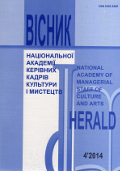THE PROBLEM FIELD OF THE MODERN CULTURE TRANSFORMATIONS IN NEW CIVILIZATIONAL CONDITIONS
DOI:
https://doi.org/10.32461/2226-3209.4.2014.138288Keywords:
globalization, identity, cultural transformations, valuesAbstract
This article reviews the influence of the globalization phenomenon on the cultural sector. The problem field is marked transformations of contemporary culture in a new civilizational terms. The issue of globalization is much discussed among scholars. An example is the considerable number of papers on different spheres regarding the interpretation of this phenomenon.
The emergence of new communication and technology development lead to increasing of the interactions in almost all spheres of culture. Thus, the study of globalization processes are taken place in the different scientific disciplines such as cultural, sociological, philosophical, economic, political, legal and etc.. The personal researches concern the impact of globalization on narrow areas of public life such as informational, linguistic, environmental. The diversity of the globalization phenomenon leads to the fact that each approach reveals only some aspects and can interpret this phenomenon as rooted in the logic of economic and industrial development, or as an epiphenomenon of the communication progress of mankind.
Among the studies of cultural transformations in the context of globalization processes we cannot forget the studies that have become classics of science such as the "Clash of Civilizations" S. Huntington and works of scientists S. Benhabib, W. Beck, D. Bell, S. Baumann, G . Bodriyara, I. Wallerstein, R. Dahrendorf, T. Eagleton, M. Castells, R. Robertson, E. Smith, A. Toffler, M. Waters, F. Fukuyama, D. Held. These studies are characterized by a tendency of the systematic consideration of the globalization process that the results in a change in the cultural realm undergo significant expression of it.
Among the works that are worth to deserve special attention by their passive, objective and nonestimate attitude to globalization and its impact on the cultural environment can be distinguished research J. Derrida, N. Varovoyi, V. Liakh, N. Pelaheshi, N. Tishuninoyi, E . Ustyugov. Great attention in these works devoted to the transformation of cultural phenomena in the modern era and the discovery of new forms, conditions and opportunities of cultural identification. Cultural aspects of globalization have analysed in the scientific works of B. Adams, S. Eisenstadt, G. Robertson, M. Firestone, U. Hannerz. The authors of these studies have focused on the identification and study of vectors and various directed dynamics of cultural development, the hybrid nature of cultural interaction. For example in this context R. Robertson emphasizes not only the probability of homogenization then the globalization cultures.
The problem of globalization impacts on the cultural sphere is drawn the attention of researchers representing various scientific areas, but the emphasis in such research relates primarily to socio-economic, socio-political or politicolegal aspects.
The goal of this article is not solving the problem field of globalization and culture "relationships" (which is basically impossible within the short article) but is its delineation and definition of the research vectors. According the given the definition of M. Waters essence of globalization is the globalization primarily cultural exchanges. Though the globalization entails a return to traditional identities but such return won’t be an adequate response to the challenge of globalization. You must create a new identity and the opportunities to realize the personality in the globalization era.
Downloads
Published
Issue
Section
License
Authors who publish with this journal agree to the following terms:
1. Authors retain copyright and grant the journal right of first publication with the work simultaneously licensed under a Creative Commons Attribution License International CC-BY that allows others to share the work with an acknowledgement of the work's authorship and initial publication in this journal.
2. Authors are able to enter into separate, additional contractual arrangements for the non-exclusive distribution of the journal's published version of the work (e.g., post it to an institutional repository or publish it in a book), with an acknowledgement of its initial publication in this journal.
3. Authors are permitted and encouraged to post their work online (e.g., in institutional repositories or on their website) prior to and during the submission process, as it can lead to productive exchanges, as well as earlier and greater citation of published work (See The Effect of Open Access).


